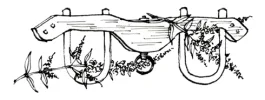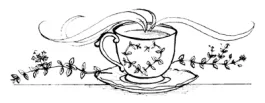
Purple Loosestrife
Lythrum salicaria
These oxen vexeth me no end. If I want
to plow forward they want to pull to
the right toward the river.
If I want to make a second pass over
the rocky soil they refuse, as if to say,
“Master, this we have done once—not again!”
I will not be undone by these beasts of burden,
these ill behaved, unruly oxen.
Sons bring me buckets of water for
the oxen. Then go near the marsh
and bring armfuls of loosestrife.
Rub the loosestrife over the necks, backs,
and flanks of the oxen to drive away the
flies and gnats. Then tuck fresh loosestrife
under their yokes in great abundance.
When the boys had done their tasks of
watering and soothing the oxen with the
herb they stood calmly, relaxed, well
behaved, ready for words from their master.
Many old European homes had keeps, food-storage rooms located off the kitchen. The meadow keep was for drying the family’s culinary and medicinal herbs and flowers.
Author and herbalist Elizabeth C. Burgess has written Meadow Keep in honor of these fragrant storage rooms. Her book is filled with delightful poems, each exploring the use of an herb.
I’d like to share four of them here.

Thyme
Thymus vulgaris
A young Roman girl
wrought with melancholy
over the departure
of her handsome warrior
cried with total abandonment
in the backyard of her villa.
Her neighbor, hearing her wails
peered over the connecting
courtyard fence and said,
“There girl, this melancholy
needs my grandmother’s cure.
I will steep the delicate
leaves and flowers of thyme
and make a soothing tea.
We will drink it together
since my husband
has run off
with my youngest sister!”

Burnet
Poterium sanguisarba
His mother, like other mothers
sending their sons off
to the Revolutionary War
tucked a leather pouch of seeds
and dried burnet leaves
into his satchel with a tin cup.
Each mother gave these instructions:
“Son, the night before you go into
battle make a tea from a few
dried leaves and seeds of burnet.
It will slow the blood in your veins
and if you are shot you will not
bleed to death.”
As they marched from skirmish to
skirmish the boys carried their muskets,
satchels and pouches of burnet leaves
believing their mothers’ tale
of slowed blood.
They believed even as their
young blood soaked
into the American soil
and the burnet seeds
took root where they fell.

Costmary
Chrysanthemum balsamita
Preacher Johnson’s wife was a wise woman
who grew lots of costmary in her garden.
The fresh fragrance of mint, lemon and
balsam mingled in the leaves.
She used the tender young leaves
of costmary in salads to please her husband
and because the sweetness cut the bitterness
of cressy and other wild field greens.
On Sundays the preacher’s wife took a
basket of dried costmary leaves to church
and placed it on the table at the entrance
to the small sanctuary.
The leaves served a dual purpose;
as a book mark for the Bibles
and as something to nibble on.
The peppery tasting leaves helped to
keep the congregation awake
during her husband’s long boring sermons.
The preacher’s wife was a very wise woman.
Reprinted with permission of the author from Meadow Keep copyright ©2013 by Elizabeth C. Burgess. You can order copies from her at 1825 Lantern Dr., Asheboro, NC 27205 (336-879-3070) for $14.95 plus $3.00 s&h each.


